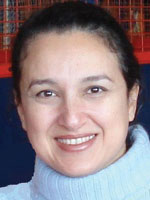Reflections on Wikipedia in the Classroom

Mona Ibrahim
Learning in today’s internet-dependent world requires new pedagogies. There is a real need to design assignments that better appeal to today’s students and allow them to engage more meaningfully and responsibly in the world we currently live in. I joined the APS Wikipedia initiative for the first time this semester and decided to replace a traditional research paper assignment with a Wikipedia assignment in which students either created or significantly expanded a Wikipedia article.
I chose to pilot the Wikipedia project in a General Psychology course. This course is very popular on campus and has the potential to draw many students into the psychology major. Therefore, I believe this course needed to be attractive to students and taught effectively. My students worked on Wikipedia articles in teams. The teams completed their significant edits and then spent the rest of the semester providing feedback on articles from other teams. They will also be improving their own articles by adding images and links to other pages as well as addressing the suggestions from their class peers and the feedback from the Wikipedia reviewers and the public on the articles’ discussion pages.
In planning the Wikipedia assignment, I found the online resources and sample Wikipedia assignments provided by APS indispensable. The sample assignments helped me develop a realistic timeline for the project and come up with a grading scheme that took into account all aspects of the work involved in such a project. The APS portal facilitated assessment of student contributions and effort by providing summary data of the amount of time, number of words, and particular text that each student contributed. The APS portal also provided a helpful list of psychology-related Wikipedia articles in need of improvement for students to select from.
Students also appreciated the portal for allowing them to see what others in the class were contributing and to identify classmates who could help them with editing difficulties. They liked the fact that the portal provided them with an easy way to complete peer reviews and that it provided a mechanism to ensure that each of their articles received an equal number of peer reviews. Moreover, the portal allowed the class to develop a sense of community and to communicate more readily with one another.
Throughout the semester, I received more valuable feedback from students on different aspects of the project. Many students indicated that they were apprehensive about the Wikipedia project at first (which was surprising to me, given the tech-savvy reputation their generation has), but they found the project more enjoyable as they proceeded with it. They felt their work was meaningful because their contributions are shared with the entire world, rather than just their instructor. They liked that their contributions will not end up in a drawer after the semester ends, but will continue to be available to many people as a useful resource. Some students even noted with pride that their contributions might have wider use than some articles published in academic journals.
My students appreciated the interactive, communal nature of the project and felt that it reflected what learning in the real world is all about. They found the challenge of presenting technical psychological information in a clear style to the general public to be a valuable learning experience. While some students felt intimidated by writing for the public on a psychological topic when they are only beginning to learn the subject, others appreciated the fact that it pushed them to develop a deeper understanding of the information they are trying to communicate.
Students greatly appreciated the feedback they received from classmates who reviewed their articles and many students wished they had received more feedback from Wikipedia editors and users. My students talked about how their self esteem was threatened when they received criticism of their writing, but they also reported that they experienced personal growth as they learned to provide more constructive criticism to others as well as to absorb criticism better themselves and use it to improve their work.
There was some frustration with the amount of time it took to figure out the Wikipedia editing syntax. My students wished they were able to dedicate more time to the research process itself and less time to learning Wikipedia code. There was also some disappointment with the speed of the Wikipedia review process. If you’re thinking of offering a Wikipedia assignment to your students, I have a few suggestions to make it go as smooth as possible: 1) Enlist the help of an expert Wikipedia Ambassador who can provide in-class editing demonstrations for students, 2) encourage students to be pro-active by sending requests for feedback to specific individuals and by nominating their articles for Wikipedia’s Good Article status, 3) have students who are creating a new Wikipedia article start the process of posting their edits to Wikipedia very early in the semester, and 4) consider limiting the assignment to upper level courses. Overall, I feel the Wikipedia assignment has been a positive experience for my students and for me.





Comments
Very interesting idea. I understand the frustation your students had with the Wiki syntax. I was unaware of their ambassadors until I read this. Thanks.
APS regularly opens certain online articles for discussion on our website. Effective February 2021, you must be a logged-in APS member to post comments. By posting a comment, you agree to our Community Guidelines and the display of your profile information, including your name and affiliation. Any opinions, findings, conclusions, or recommendations present in article comments are those of the writers and do not necessarily reflect the views of APS or the article’s author. For more information, please see our Community Guidelines.
Please login with your APS account to comment.